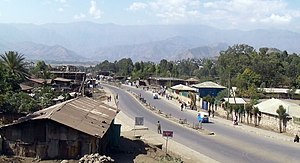Woldia
|
Woldia ወልደ Woldia or Woldiya |
|
|---|---|
 |
|
| Location within Ethiopia | |
| Coordinates: 11°49′50″N 39°36′0″E / 11.83056°N 39.60000°ECoordinates: 11°49′50″N 39°36′0″E / 11.83056°N 39.60000°E | |
| Country | Ethiopia |
| Region | Amhara |
| Zone | Semien Wollo Zone |
| Elevation | 2,112 m (6,929 ft) |
| Population (2017) | |
| • Total | 146,139 |
| Time zone | EAT (UTC+3) |
Woldia (Amharic: ወልደ) (also spelled Weldiya or Woldiya, "Wold/Weld") (Ge'ez: ወልደ meaning "Son") is a hillside market town, capital of the Semien Wollo Zone, and woreda in northern Ethiopia. Located north of Dessie and southeast of Lalibela in the Amhara Region, this town has a latitude and longitude of 11°50′N 39°36′E / 11.833°N 39.600°E and an elevation of 2112 meters above sea level.
A notable landmark is a church Weldiya Gebri'el. Travertine for use in building has been worked on a minor scale nearby.
When the missionary Johann Ludwig Krapf passed through Weldiya in April 1842, it was the headquarters of Dejazmach Faris Aligas and his brother Birru. They were absent at the time of Krapf's visit, raiding the territories of Imam Liban of the Were Himano.
As early as 1890, Weldiya was the administrative center of Yejju Province. Its Tuesday market was well known for its mules. Weldiya was attacked in 1948 by the Yejju Oromo as part of the "Woyane Rebellion." Revolting after their appeals over their loss of land, they seized the prison in Weldiya and freed the prisoners. Despite this success, the revolt was eventually put down. On 16–17 November 1988 Weldiya was subjected to an aerial attack by the Derg, but no deaths were reported.
...
Wikipedia

